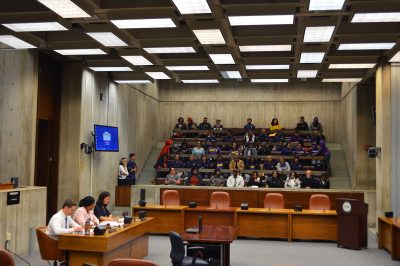
About 75 people convened at a Boston City Council hearing Thursday afternoon at City Hall to discuss the implementation of the OneCard Municipal Identification Program.
The program is still under development, and the card may include a unique identification number for all Boston residents — regardless of immigration status, housing circumstance and gender identity, Felix Arroyo, the city’s chief of health and human services, said during the hearing.
The hearing was led by City Council President Michelle Wu, Councilor-At-Large Ayanna Pressley and District 8 Councilor Josh Zakim. Four panelists were present, and they expressed support for the program.
Pressley said the program, if implemented, would enhance city services and residents’ safety.
“This will be a transformative move for the city that will lead to increased public safety and access to essential services,” Pressley said during the hearing. “Every single Bostonian, regardless of immigration status, contributes to their community, deserves to feel safe in their community, and to be able to more easily navigate agencies that require identification.”
Boston Police Department Superintendent-in-Chief William Gross was one of the four panelists at the hearing. Municipal IDs, Gross said, would contribute to the police’s efforts in community policing and creating a comfortable environment for Boston residents.
“The municipal ID presents a great step forward to solidify the citizens of Boston,” Gross said at the hearing. “Having an ID will strengthen the confidence in citizens and help facilitate any interaction with first responders, whether they be police, emergency medical services, or the fire departments.”
Roxana Rivera, the vice president of 32BJ SEIU, a property service workers’ union, testified in support of the program following the hearing.
Rivera said the ID program could provide wider opportunities for residents, including undocumented immigrants.
“We believe the municipal ID can help to break down this stigmatization and barriers that stop immigrants and other chronically undocumented people from participating fully in the civic, cultural, and economic life of the city,” Rivera said at the hearing. “Ultimately we feel that our communities will be safer and stronger when folks can participate fully in the life of the city.”
Attendees said after the hearing they are in favor of having a municipal ID because it would benefit disenfranchised communities.
Sean Curran, 46, of Somerville, said municipal IDs contribute to making the immigrant population feel welcomed in Boston.
“I don’t think the City of Boston wants to be anything but welcoming and engaging with immigrant communities,” he said. “As it was stated in the hearing, 27 percent of the residents in the City of Boston are foreign-born. They are a vital and huge part of what makes the culture here great, and they should not have to live in the shadows.”
Elisabeth Jackson, the executive director of support group Bridge Over Troubled Waters, said the program is not only important for its impact on homeless youth but also for its ability to include immigrant populations in the Boston community.
“It will impact the city in a great way for all the legal reasons,” Jackson said. “We will have to make sure a lot of immigrants are paying tax dollars and they have all the rights that everyone else does.”
Camila Aviña, an official at the Consulate General of Mexico Boston, said this initiative will have an important impact on the Mexican community and the population of immigrants in Boston.
“For many immigrants, having an ID is essential to have access to public services as well as private services,” she said. “As a means to open a bank account or to get health insurance and many other things that are very important for their daily lives.”
















































































































